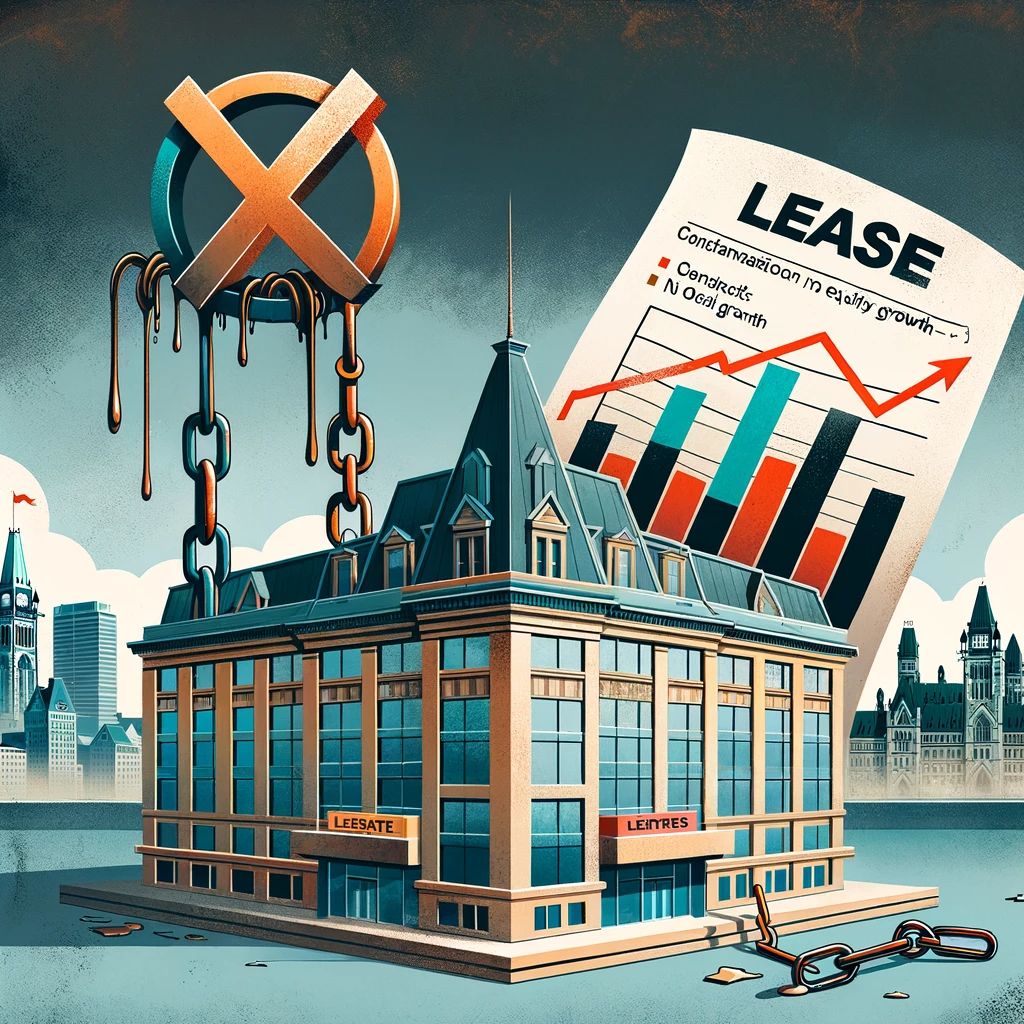Analyzing Lease vs. Buy Options in Ottawa's Commercial Real Estate Market
Choosing between leasing and buying commercial real estate is a pivotal decision for businesses in Ottawa. This choice not only impacts immediate operational logistics but also long-term financial health and growth potential. In Ottawa's dynamic real estate market, the implications of this decision are magnified by unique local market trends and economic conditions.
The decision to lease or buy is not one-size-fits-all; it varies significantly based on business needs, financial stability, and future growth plans. While leasing might offer flexibility and lower upfront costs, buying could mean long-term financial gain and stability. Each option comes with its own set of benefits and challenges that must be carefully weighed against the specific circumstances and objectives of a business.
Understanding the Ottawa real estate market is crucial in this process. The market's trends, property values, and economic forecasts play a critical role in determining the feasibility and potential returns of buying versus leasing. Additionally, the decision is influenced by factors like location preferences, size requirements, and the nature of the business.
This article delves into the pros and cons of both leasing and buying commercial real estate in Ottawa, offering a comprehensive guide to help business owners and decision-makers navigate this complex landscape. From financial implications to legal considerations, we aim to equip you with the knowledge to make an informed choice that aligns with your business goals and market conditions in Ottawa.

The Pros of Buying Commercial Real Estate in Ottawa
1. Long-term Location Security
Investing in commercial real estate in Ottawa offers long-term location security, a significant advantage for businesses seeking a permanent home. Owning a property ensures a stable operating base, free from the uncertainties of lease renewals or changes in rental agreements. This stability is vital for businesses that require custom-built facilities or have invested heavily in their current location.
2. Freedom in Property Use and Modifications
Ownership grants unparalleled freedom in terms of property use and modifications. Businesses can remodel, expand, or alter their space to meet evolving needs without seeking approval from a landlord. This autonomy allows for a tailored environment that can enhance operational efficiency, employee satisfaction, and customer experience.
3. Investment Benefits and Wealth Growth Potential
Real estate in Ottawa has historically appreciated over time, presenting a valuable investment opportunity. Owning commercial property can be a significant asset, contributing to a company's financial strength. As the property's value increases, so does the business's equity, offering an avenue for wealth growth. This aspect is particularly appealing in Ottawa, where the commercial real estate market has shown resilience and growth potential.
4. Cost Savings in the Long Run
Although buying requires a substantial initial investment, it can lead to cost savings in the long run. Fixed-rate mortgages stabilize monthly payments, making financial planning more predictable compared to the variable nature of lease payments. Over time, as the mortgage is paid down, the cost advantage over leasing becomes increasingly evident.
5. Tax Implications and Benefits
Purchasing commercial property comes with several tax advantages. Owners can deduct expenses such as mortgage interest, property taxes, and depreciation. These deductions can significantly reduce the overall cost of ownership. Additionally, owning real estate opens the possibility of leveraging the property for loans or refinancing, providing financial flexibility for the business.

The Cons of Buying Commercial Real Estate in Ottawa
1. Financial Risks, Including Variable Interest Rates
Buying commercial property in Ottawa carries certain financial risks, chief among them being the exposure to variable interest rates. While fixed-rate loans offer predictability, they often come with higher initial rates. Variable-rate loans, meanwhile, can fluctuate, affecting monthly payments and making financial planning more challenging. Additionally, in a downturn market, there is the risk of property devaluation.
2. Higher Initial Capital Requirement
The upfront cost of purchasing commercial real estate is substantially higher than leasing. This includes not just the purchase price but also closing costs, property inspections, and potential renovation expenses. For some businesses, especially startups or those with limited capital, this high initial investment can be a significant barrier.
3. Need for Extensive Due Diligence
Purchasing a property requires extensive due diligence. This process involves legal checks, property inspections, environmental assessments, and more, all of which can be time-consuming and costly. The due diligence is critical to ensure that there are no hidden problems with the property, which could lead to unexpected expenses or legal issues down the line.
4. Maintenance and Management Responsibilities
Owning a property comes with the responsibility of maintenance and management. This includes regular upkeep, repairs, and potentially, property management. These responsibilities can be significant, requiring time and resources that could be allocated elsewhere in a leasing scenario.
5. Market Fluctuation Risks
The real estate market is subject to fluctuations, and Ottawa is no exception. While property values can increase, there's also the risk of a market downturn, which can affect the property's value and the owner's investment. Such fluctuations can impact the decision to sell or leverage the property in the future.

The Pros of Leasing Commercial Real Estate in Ottawa
1. Lower Upfront Costs
One of the most significant advantages of leasing commercial real estate in Ottawa is the lower upfront costs compared to buying. Leasing does not require a substantial initial investment like a down payment, making it a more accessible option for many businesses, especially startups or those with limited capital.
2. Flexibility for Growing Businesses
Leasing offers flexibility, particularly valuable for growing or evolving businesses. It allows companies to adapt to changing needs without the long-term commitment of property ownership. Whether a business needs to upsize, downsize, or relocate, leasing provides the opportunity to do so with relative ease.
3. Simplicity and Lesser Commitment Compared to Buying
Leasing commercial property typically involves less complexity and commitment than purchasing. This can be advantageous for businesses not ready to make a long-term investment in real estate. The leasing process is generally quicker and less burdensome, freeing up time and resources to focus on business operations.
4. Access to Premium Locations Without Substantial Investment
Leasing can provide access to premium locations in Ottawa that might be too expensive to purchase. This is particularly beneficial for retail businesses or those where location is a key factor in operational success. Leasing in a prime location can enhance visibility, customer access, and overall business prestige.
5. Reduced Responsibility for Maintenance and Repairs
In most leasing arrangements, the responsibility for maintenance and major repairs lies with the landlord. This reduces the burden on the business, both financially and in terms of time and resource allocation. It allows business owners to focus more on their core activities rather than property management.

The Cons of Leasing Commercial Real Estate in Ottawa
1. Restrictions on Property Modifications
One significant limitation of leasing is the restriction on property modifications. Tenants often have limited or no freedom to alter the leased space to suit their specific business needs. This can be a major drawback for businesses requiring custom layouts or branding elements in their premises.
2. Potential Long-term Cost Inefficiencies
While leasing may seem more affordable in the short term, it can be less cost-efficient in the long run. Over time, the cumulative cost of leasing can surpass the investment required to buy a property, especially in a market like Ottawa where property values consistently appreciate.
3. Risk of Non-renewable Leases
Leasing comes with the inherent risk of non-renewal. Once a lease term ends, there's no guarantee of renewal, which could force a business to relocate. This uncertainty can be particularly challenging for businesses that have become established in their location and built a client base around it.
4. No Equity Building or Investment Returns
Unlike buying, leasing does not contribute to building equity or investment returns. Tenants do not benefit from the appreciation in property value, missing out on a potential source of wealth accumulation and long-term financial security.
5. Dependence on the Landlord for Property Improvements
Tenants are often dependent on landlords for property improvements and maintenance. This reliance can lead to frustrations, especially if the landlord is unresponsive or unwilling to make necessary updates or repairs. It can also result in additional costs if tenants have to bear the burden of improvements.
Navigating the lease versus buy decision in Ottawa's commercial real estate market is a complex but crucial task for any business. This article has explored the various facets of both options, highlighting the pros and cons of each to provide a balanced perspective.
On one hand, buying offers long-term stability, equity growth, and the freedom to modify the property as needed, but it also comes with significant upfront costs, financial risks, and responsibilities. On the other hand, leasing provides flexibility, lower initial costs, and less responsibility for maintenance, yet it lacks investment benefits and can lead to long-term cost inefficiencies and restrictions on property use.
The decision ultimately depends on the specific needs, financial situation, and long-term goals of your business. While buying may suit businesses looking for stability and investment opportunities, leasing might be more appropriate for those seeking flexibility and lower upfront costs.
It's crucial for businesses to thoroughly analyze their financial capabilities, consider their long-term strategic goals, and understand the nuances of the Ottawa real estate market before making this decision. Consulting with real estate professionals, financial advisors, and legal experts can provide valuable insights and guidance.
In conclusion, whether to lease or buy commercial real estate in Ottawa is a decision that requires careful consideration of various factors. By weighing the advantages and disadvantages of each option, businesses can make an informed decision that aligns with their objectives and positions them for success in Ottawa's vibrant commercial landscape.
If you want to discuss the purchase of commercial retail space in Ottawa, call Roch St-Georges at 613-889-7732, email, or book a video or phone call here.





